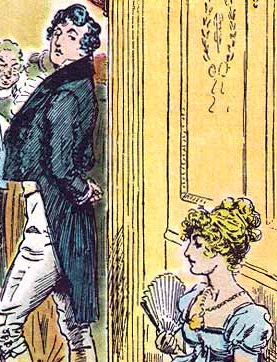| English: "To assure you in the most animated language" - Mr. Collins proposing to Elizabeth. Austen, Jane. Pride and Prejudice. London: George Allen, 1894. (Photo credit: Wikipedia) |
| English: Illustration by Hugh Thomson to Jane Austen's novel Pride and Prejudice, ca. 1894. (illustration to Chapter 14). with Mr Collins protesting he never reads novels. (Photo credit: Wikipedia) |
| Detail of a C. E. Brock illustration for the 1895 edition of Jane Austen's novel Pride and Prejudice (Chapter 3) (Photo credit: Wikipedia) |
Reverend Collins' "grand gesture" with its grand inferences that he is bravely willing to wait Lizzie out of her play-acting...was aimed to get her to give him what he wanted. In his idea, it meant she should surely come to her senses and thereby drop her pretenses.
Mr. Colllins had already reminded Lizzie that his state in life and his connections were by far higher and better than those of her family. He had also pointed out to her, in clearest language, that she was unlikely to receive other proposals of marriage. His message was that she was toying with him, on purpose, to increase his interest or ardor (for he could not consider any other explanation) and that he was by far an even better "catch" than she, the next to oldest of the five Bennet daughters, should be able to imagine. If in their right minds, that is...according to Reverend Collins.
The "grand gesture" can be seriously offered or, as in the case of Mr. Collins, it can be shown in its unlikeliness. He really did not mean that he knew she might refuse him again. Rather, he made his grand gesture by trying to straighten out her thinking, to bring her back into her right mind or as a way to save face. Either way, such a gesture underestimates the one to whom it is offered. It also can appear to be based on magnanimous, exceptionally unselfish or generous (depending on the perspective) qualities of the one performing it.
The grand gesture is counterbalanced weightily by the grand action. The grand action is a powerful action that does not happen in dramatic form or with high-spoken words. It often has no words. It occurs simply, practically, and with no possibility of refusal by the other person whose well-being is the heart of the matter. The object of grand actions is others' well-being: Think of the medic running into battle to save a wounded soldier; think of anyone taking selfless action before anyone can object or stop it. Those who perform grand actions abhor credit or having attention drawn to themselves, their "bravery," "wisdom," or "unselfishness."
I have never played team sports, but I love sports stories. These can include the grand gesture, something not expected to be accepted or allowed to happen. However, sports stories have grand actions, including youth sports. There is the rare, private example of a player that steps aside for a teammate to have a rare opportunity. There is no matter of words to the recipient: the player does not want his teammate even to know what he has done, only the coach.
In life we recognize grand gestures, which quickly fade in significance; less often do we learn of the grand actions that have affected our lives. I think the most fortunate among us may know of a time we learned about much later, when a parent made a grand action for us. It happened for me, the recipient, and was done by my dad in a matter that I learned about from my mother, decades later. Grand gestures versus great actions in life and in literature can show us much about human behavior and motivations. The darkest night is more dramatic, but the dawn of day invites hope and possibilities.
The grand action always presents itself as a fait accompli. So, friend, it is done. Eventually we learn that Mr. Darcy, Lizzie's suitor, is a difficult man of surprisingly grand actions...that unfold in time and without fanfare.
Maybe such a sports grand action would seem to happen only in literature or a movie script, but we know it happens in real life. And when that happens, decisions are made and acted upon, before anyone can reverse them, change them, or prevent the cost borne by the one taking the action.
What moves life and the stories we love are the contrasts of character development that include such ideas and scenes, from Austen to Dickens to P.D. James, Jan Karon, and, fortunate for us, many others.






